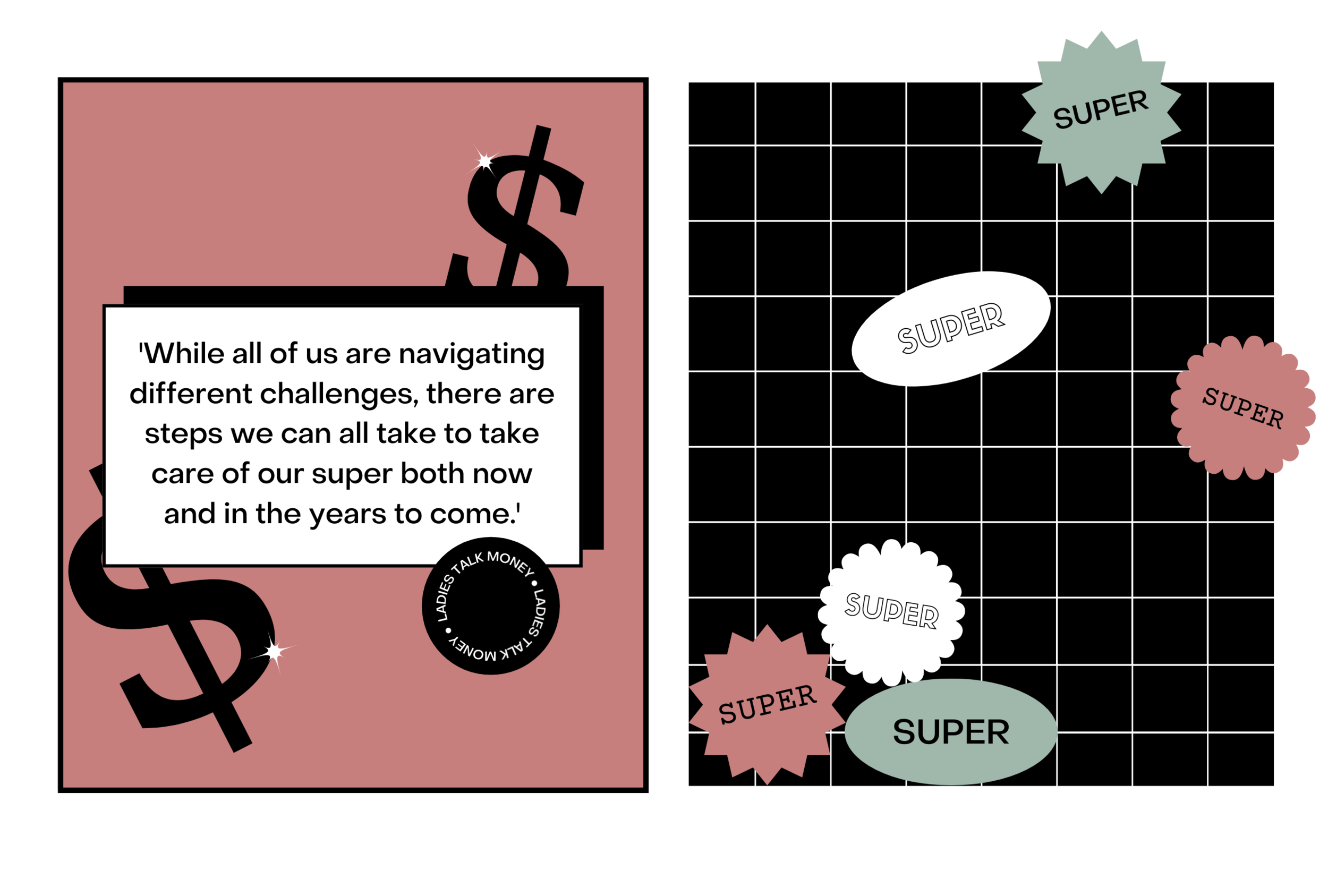Super 101 - Part Two
Aaaaand we’re back with Part Two of our deep dive into superannuation! This time, we’re getting across all the ways you can make the most of your super, no matter what stage you’re at.
Looking for part one? You can find it here!
Superannuation mightn’t be the most thrilling of topics, but there are tonnes of reasons why we need to have it on our radar (even in our 20s and 30s). By understanding how super works, and what steps we can take to boost our super balance, we can have a really significant impact on the life our future self gets to lead.
We know that all of us are navigating a different financial journey. So, here are a few tailored tips to help you take care of your super, no matter where you’re at:
✸ If you have a low income or are receiving government benefits
Take advantage of the low-income super tax offset: if you’re earning less than $37,000 per year you may be eligible for a government super payment of $500 (paid directly into your super fund). You don’t need to do anything to receive this boost, just make sure your tax file number (TFN) is added to your super fund.
If your super balance is low, speak with your super fund and find out if they’re charging you fees on your balance. Some funds don’t charge their annual fixed admin fee if a member’s balance is less than $5,000.
Make small, regular contributions into your super fund whenever you can. Even putting aside $10 a month can help to grow your super balance by hundreds (if not thousands of dollars) by the time you can access it.
Think about consolidating your super accounts to keep all your funds in one account (and save on duplicate fees). However! Before you do so, think about what insurances you have in each super fund and what cover is most appropriate for you. This will help you make an informed decision about which accounts to move or close. In some instances, it can be a strategic move to have more than one super account. If you’re unsure, it’s always a good idea to have a chat with a financial adviser about what’s best for you. (we know a good one 😉)
Super splitting - if your partner earns a higher wage, consider splitting their super contributions to top up your super balance. This means your partner transfers money from their super fund into yours. Find out more about super splitting here.
And here’s another reason why super isn’t so super: for women in same-sex relationships, super splitting was for too long not a viable option and queer women don’t have a potentially wealthy male partner to boost their super balance. Not to mention how much our system is designed for dual-income households or couples, leaving all the single ladies and single mums to fend for themselves...
✸ If you’re self-employed
Remember to pay yourself super: as you are your own employer, it’s essential you contribute to your super on a regular basis. Find out more about making self-employed super contributions here.
Calculate what you need in retirement: did you know it’s estimated that a single woman will need around $42,764 per year to live comfortably during retirement? If you’re not sure whether you’re on track, try out the ASIC Money Smart Retirement Planner Calculator to help you figure out if you need to make some changes.
Take advantage of super tax benefits: as your own boss, you can claim up to $25,000 in “concessional” (pre-tax) super contributions. These are taxed at a lower rate than your personal tax rate, making it a smart way to boost your super balance.
Keep on top of your cash flow: never miss a super contribution again by setting up regular, automatic super payments into your fund. These small, recurring payments are a great way to help you manage cash flow and save for retirement.
Reducing your super fees: 36% of us have multiple super accounts. Yep, and each of these accounts is charging you fees. Consolidating your super accounts is an easy way to reduce fees and safeguard your super balance, unless as we mentioned before, you have more than one fund for strategic reasons.
✸ If you’re on, or about to take, parental leave
Consider super contribution splitting with your partner: while you’re taking time out of work, it’s a wise move to consider splitting super with your partner. This will ensure your super balance continues to grow to ensure a more equal distribution of wealth when retirement comes around.
Speak to your fund about fees: did you know Verve Super offer a ‘Baby Bump Program’ that allows member to pause admin fees for 12 months when they become new parents (whether by birth or adoption) or if they have their working hours reduced - which is something we believe every super fund should offer their members, right?
✸ If you’re passionate about ethics and sustainability
Check where your money is invested: don’t be fooled by marketing buzzwords such as ‘green’ and ‘eco-friendly’ that are used by many funds who still invest your money into harmful industries such as coal, forest logging, and live animal export. Do your own research and find out exactly what companies and industries your super fund invests in. If they truly are ethical, they should have nothing to hide and the information should be easy to find!
Hold your super fund to account: if you’re not happy with how your money is being invested, chat with your super fund and share your concerns. If you’re not happy with their response, take your money elsewhere to a fund that better aligns with your values.
Remember: In Australia, superannuation companies will soon own more than half of the Australian Stock Exchange, a real testament to how powerful your investment can be in shaping a more fair and ethical future.
✸ If you're nearing retirement
Consider chatting with a financial adviser to help you understand your options during retirement. There are a bunch of options available (whether you choose to continue working, access your super balance or access the age pension), and a financial adviser can help point you in the right direction for your situation.
Start an open conversation with your loved ones about what your life will look like after work. Where will you live? Do you have an up-to-date will in place? Having these open and honest conversions early will ensure you’re all on the same page about your plans both now and in the years to come.
What do I do now?
While all of us are navigating different challenges, there are steps we can all take to take care of super both now and in the years to come. It’s true that super is often complex and confusing, but understanding how it works and having a few tricks up your sleeve to boost your balance can help you grow your wealth up until the time you ‘retire’.
For us as individuals, that means understanding the mechanics of how super works, where your money is invested and the steps you can take to boost your super balance based on your personal circumstance.
For women collectively, it means talking about money (and importantly, super!) with our friends, family, partners, employers as well as considering ways we can put our money into more ethical super funds. Plus, it means calling on governments, policy makers and super funds themselves to offer fair, tailored solutions to women’s specific needs. By picking up the phone, signing petitions like Verve’s Make Our Future Fair, writing a letter or email to your local MP or Senator - you can do your bit to push for systemic policy change that will improve outcomes for all women.
Thanks for sticking with us, lady! We know that a deep dive into super might not be first on the list of fun ‘to-do’s’, but we promise it’s, quite literally, worth it.
Want to keep diving? Here are some handy super-related resources:
WATCH: Instagram Live with Verve Super Co-Founder & CEO Christina Hobbs
WATCH: Ladies Talk Money Part 3 ‘Women’s Work’
READ: The Invisible Work of Women and the hidden costs of the mental load
READ: Why a Woman’s (Unpaid) Work Is Never Done
Hey lady! We want to pop in and remind you that any of the information provided in this post is general advice only, and you should always reach out if you’d like to discuss your individual circumstances and needs. Also, we don't have any direct affiliation with the super funds mentioned, nor do we recommend or endorse their services. We’ve either mentioned them for educational purposes or, we happen to think they’re doing some great things for women’s financial equality, which in our view, is a very important conversation.



